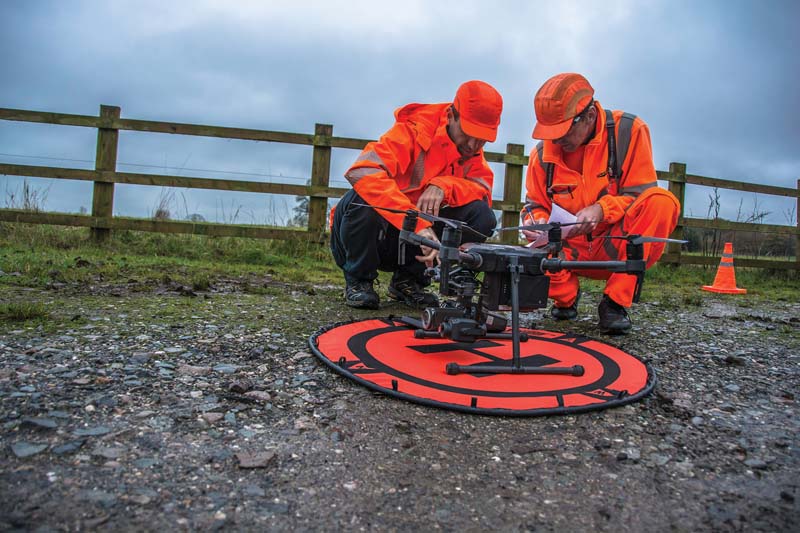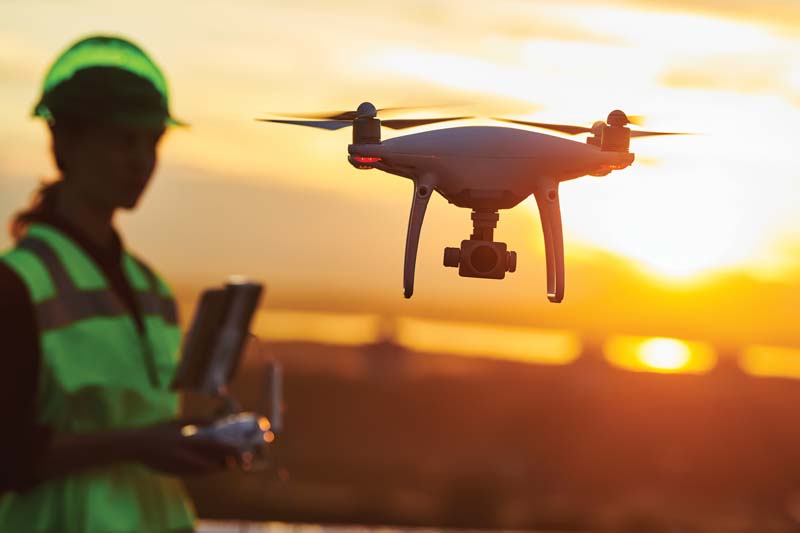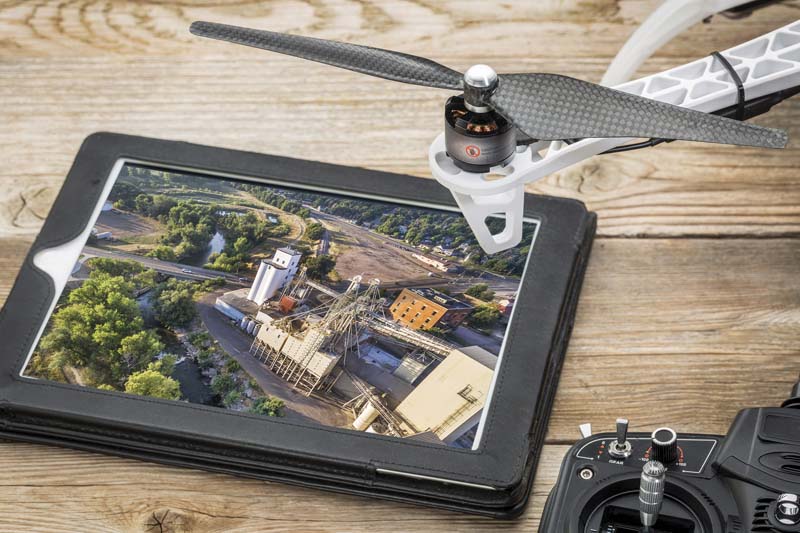There are few events in your professional life more rewarding than starting your own business. The ability to take an idea and grow it into a thriving entity is a dream many people share. Unlike some business endeavors that require large amounts of capital or extensive training, drones offer a chance for anyone to become their own boss.
I have been fortunate enough to start several businesses. Some were great successes, while others burned up in a blaze of glory. Each was a priceless learning experience that led me to my career in the UAV industry. In 2017, I started my drone service business, Vigilante Drones, and in 2018 I started a nonprofit, Vigilante Cares, that uses drones to help veterans with post-traumatic stress disorder (PTSD). Over the years, people have asked me how they can start their own drone service companies.
After the last such conversation, I wrote out the ten steps I believe are crucial to starting a drone-based business. I hope they can help you find the same financial freedom and satisfaction that Vigilante Drones and Vigilante Cares have brought me.
But First …
Allow me to start by saying I am not a lawyer or a certified public accountant (CPA). There are risks involved in starting any business, and I highly recommend that you speak with legal and financial professionals for expert guidance. Meeting with these experienced and trained individuals is best done before telling your current boss that you quit, or before taking out a second mortgage to buy the $100K quadcopter you have your heart set on.
Although I would need to write a book to go into great detail, in this article I will mention the big-ticket items for starting a drone service business. I encourage all readers to explore the free resources I mention for more extensive advice. With those caveats out of the way, here are my ten steps to starting your own drone service operation.
1. Get Certified (Part 107)
As commercial drone pilots, the law requires us to have a Remote Pilot Certification from the FAA (Part 107). If you plan to make money with a drone, this is Step One. While learning the material for the Aeronautical Knowledge Test (AKT), you will get an idea of whether or not you have sufficient interest in drones. For some, the material can seem highly technical, and therefore a tad bit dry at times. Responsible pilots will always follow the rules and regulations set forth by the FAA and other government agencies. Studying for the exam will help you to decide if you have what it takes to fly the friendly skies and make money at the same time.
2. Market Research
Drones are beneficial tools in a wide range of industries. Your task during this step is to determine what drone services your business will provide. To do this, you must first understand your potential customers and your local market.
It might seem as if offering photography, thermal imagery, agricultural services, utility inspections, LiDAR, mapping, and more is the best answer to this question, but don’t bite off more than you can chew. Ask yourself what equipment you can actually afford and become proficient with. Then, consider what kind of services your local market could use.
What is the demand for drone services in your area? What types of drone services are needed? How many potential customers are there? Where are your customers located? What does the competitive landscape look like? What rates can you charge for your services?
The answers to these questions will form the foundation of your drone business. They will be the building blocks for the plan you will put together in the next step.

3. Develop a Plan
Your business plan is like a blueprint for success. It can be a long, formal document, or it can take up less than a page. (Sometimes short and sweet is better.) Amazon founder Jeff Bezos wrote the rough idea for Amazon.com on a paper napkin. Use the knowledge gained from your research to lay out what your business is going to do and how it is going to do it.
Use your market research to decide which services you will offer. This will also identify what drones, equipment, and software you will need. Decide on what you will charge for each service. For Vigilante Drones, I started simply with real estate photography using a DJI Phantom 4 Pro. I offered additional services later when I could afford more gear and specialized training.
The Small Business Administration (sba.gov) is a great free resource for developing a plan. I highly recommend checking them out. You will find some useful tools and templates that will help guide you through the entire process of starting your business.
Another organization worth looking into when building your plan is the Service Corps of Retired Executives (SCORE.org). SCORE is a free resource that offers mentors to assist you in your small business journey. The advice of these seasoned professionals has helped me many times.

4. Decide on a Business Structure
There are many different structures for your drone business to operate under. Some options to choose from are: sole proprietorship, partnership, limited liability company (LLC), C corporation, and S corporation. To me, the structure that made the most sense for Vigilante Drones was an LLC.
The business structure you choose will have a significant impact on the legal protections you have and how the money you earn will be taxed. For this reason, I recommend that in this phase you have a lawyer and a CPA involved in the discussion.
5. Make a Financial Plan
The financial portion of your plan is your best chance at predicting the future. Here, you will consider the expenses involved in starting and operating your business. What equipment will you need and how much will it cost? Will you pay for monthly insurance? Do you need an office to work out of? What will the government charge you to run your business? Do you have employees?
With a clear idea of the total cost, you must then confirm that the amount you earn will cover expenses and generate a profit. Be honest with yourself when projecting revenue. It is unlikely you will open for business and immediately see tens of thousands of dollars per month coming in. Use your research to make cautious and well-thought-out projections.
This is the time to decide how you will fund your enterprise. Are you using your savings, or will you need a loan? Can you borrow from family or friends? You have many options and must weigh them carefully.
Take some time to consider where your business will do its banking. Are you a sole proprietor, using your personal bank accounts, or do you need to set up separate accounts just for your company?
6. Decide on an Accounting System
Nothing tells the actual state of a business more than a look at the accounting books. If you plan to keep everything written on sticky notes, you are likely to face an uphill battle. Whether you decide to record financial data on your own with spreadsheets or use off-the-shelf accounting software, such as Wave or TurboTax, decide on a system and stick with it. You’ll be thankful you did, especially during tax season.
7. Decide on a Name and Register It
I started Vigilante Drones while living in Montana. Montana’s history is tied to accounts of vigilante justice. While it is rarely the case in practice, the romanticized version of the vigilante is that it’s someone who takes matters into his own hands to ensure that outcomes are just and fair.
The area I lived in had almost no drone services. I wanted my company to be a just and fair provider of drone services and an ambassador for UAV technology in the region, hence vigilante became part of the company’s name.
Once you decide on a name that feels right, make sure you register it. You can do this with your Secretary of State and the federal government. While registering your business name, you can also get any necessary permits and licenses your business requires.
It is important to check that the name you chose is not already being used. You can find out easily by doing a search to see if your name appears as a website. Suppose your initials are DJI, and you think that would be a great name for your business. In a search, you would find that the web address and several related emails is already taken.

8. Choose a Business Location
For most of us, the location we live in is where our business will be established. However, it might turn out that your market research directs you to a neighboring city. In some cases, you might even decide that relocating far away is best. Let the market tell you where your operation has the best chance to thrive, and then go for it!
Remember, each state has its own laws and taxes. When I started my companies in Montana, I benefitted from operating in a very tax-friendly state. When we moved our operation to California, we had to factor in much higher taxes. The move was the right step, but I’d be lying if I said I didn’t miss Montana’s much lower fees and tax rates.

9. Get Yourself and Your Team Ready
Once everything is set up, make sure you and your employees are ready to open the doors. Has all training been completed? Does everyone know what their roles and responsibilities are? Are your policies and procedures in place to make sure your aerial operations are safe?
At this point in your endeavor, SCORE is an excellent resource to help double-check that you haven’t forgotten anything.
10. Promote Your Business
Finally, once everything else has been taken care of, you need to let your customers know you are open for business. Business cards, flyers, phone calls, email campaigns, or just pounding the pavement and going door to door will let people know the services you are providing.
When I started Vigilante Drones, I made some business cards and went door to door, offering my services to businesses and farmers. I have gained valuable contacts and landed more gigs using this method than any other. Your market may be different. Experiment with different techniques to see what works best. Remember that marketing is continuous. Unless you have more work than you can handle, you need to continually be looking for new customers, or cultivating relationships with your existing customers.

Final Thoughts
I hope this brief overview of starting your own drone service business will help you begin your entrepreneurial journey. The UAV industry is just now taking off (pun intended), and we are only beginning to tap into the potential of drones. For all those brave people willing to start their own businesses, I hope that the sun always shines on you and your endeavors.
By David Daly




















Hey so i read that you started in real estate photography. I was curious how you got your foot in the door there. Did you offer interior packages as well as exterior? Or did you just go door to door letting each agency know your buisness?
We want to manufacture drone for all purposes in large scale
Hi David,
Thank you for putting this very informative article together. Many of the steps you’ve described here are things that I’ve also identified in my quest to transition from a 22+ year “corporate” career into one where I own my own drone business. With the capabilities of these devices constantly increasing and the seemingly endless possible use cases for drones I think it’s time for me to take action. Are there any resources you’ve found helpful to learn more about the capabilities and technologies utilized with drones that we may also benefit from?
Hello David,
Thank you for the insights about the drone services investment. Am a young tech enthusiast and I think this is a worthy investment if properly strategized. Currently am in Africa, and the drone market is not tapped yet, this is a great niche. More resources on technologies and capabilities of drones will be helpful.
Question on pricing?
If I wanted to start something basic with real estate photography and construction photography using a fairly reasonable drone what does pricing look like? Is it an hourly rate a project rate I’m curious what Mom would charge for say a 4000 square-foot house. Do you usually include the production of the video?
One* not Mom. Silly silly.